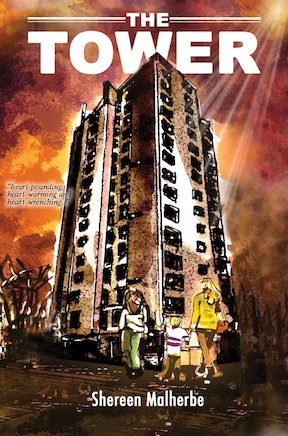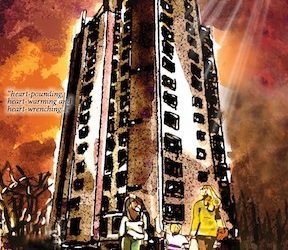Content Warning: bombings, death, mass shooting.
With the the three-year anniversary of Jasmine Falling just around the corner, author Shereen Malherbe has graced us with The Tower, her second novel. Here’s the blurb from her website:
“Reem is a Syrian refugee who has arrived in London, trying to discover the whereabouts of her 10-year old brother, Adar. Obsessed with history and consumed by her fragmented memories of home, Reem is also hiding secrets she hopes will never be revealed.
After being placed in a tower block, she befriends Leah; a single mother who has been forced to leave her expensive South Kensington townhouse. Their unlikely friendship supports them as they attempt to find their place in a relentless, heaving city, and come to terms with the homes they left behind.
Both bold and timely, The Tower shows how Reem and Leah’s lives change and intersect in the wake of individual and communal tragedy, as well as in their struggle to adapt to a rapidly shifting society.”
The Tower is a fast-paced book full of unexpected events. From the beginning, Malherbe throws the reader right in the middle of each characters’ tumultuous lives. Reem is fleeing the violence plaguing her Syrian homeland and Leah is fleeing the shackles of her self-centered, overbearing parents. By the time they become neighbors, both women are penniless and desperate to get back on their feet. Malherbe slowly reveals details of the characters’ backstories over the course of the novel. It’s up to the reader to keep track of the details and try to piece them together. We’re kept guessing until the very end, and we learn a few things along the way.

Leah’s story illustrates the importance of remaining humble. Her parents are wealthy, but after they cut her off she doesn’t hesitate to take a job cleaning her former neighbor’s house in order to support her son. Rather than turn her nose up at her new neighbors in the Muslim ethnic enclave she now calls home, Leah attends community events and gets to know the people around her. As Leah continues to suffer great loss, she calls on Reem and her other new friends for support.
Reem shows similar strength and humility. Her story humanizes asylum-seekers and reminds xenophobic people that immigrants don’t “drain government resources,” and that their potential economic contributions should not determine whether they deserve the right to safety. Reem’s story also reminds readers that many refugees have suffered unspeakable horrors not only in their home countries, but also in their new contexts (many of which only begrudgingly accept displaced peoples).
For Reem, the people who claim to be helping her wind up doing the most harm. Even after she officially resettles in England, people and objects from Reem’s past continue to haunt her. As she begins to reconstruct her fragmented memory, she unravels a conspiracy that shakes her to her core. Fortunately, she has Leah to rely on, as well as her unwavering belief in Allah.
In essence, The Tower is the story of two incredibly strong women. Their singular focus on rebuilding their lives gives them the strength and motivation to keep moving forward. This is not to say, however, that the women are unfeeling people. At times, Reem and Leah show signs of depression, anger and PTSD. Still, they do the best they can with what they have, and although there are male characters in the book, Malherbe doesn’t write in men as their saviors. In fact, one man even rejects Leah’s attempt to get close to him by gently reminding her that she doesn’t need him; rather she needs what she thinks he represents.
I’ll be frank: The Tower destroyed me. The story was fraught with emotion and it seemed like suspenseful situations lurked on nearly every page. Just as with Jasmine Falling, I narrated bits of the story to my mother, who quickly became just as invested in the story as I was. We started coaching the girls from the sidelines. At one point, while reading in my room, I let out such a loud, pained scream that my mother came hurtling upstairs to make sure I hadn’t injured myself. Based on the trajectory of the story, I expected the event that caused the reaction, but that doesn’t mean it didn’t hurt. I felt like I was standing with the girls from beginning to end; their pain was my pain. After I finished reading, I had to take a few days’ break before picking up another book, because I was still thinking about Reem and Leah. I’m more than satisfied with the way the book ended, but their victories were hard-won.
Personally, I didn’t relate with the characters at all, but I didn’t feel like that mattered, either. Reem and Leah were so tangible that I cheered for them just as I’d cheer on any friend. Malherbe weaves their stories together so seamlessly that the transition between them is imperceptible. When their stories come together, the meeting feels natural, as if the two women hadn’t been born in extremely different environments.
The Tower is one of those books that touches on a variety of current issues without being too on-the-nose. In addition to writing about the refugee crisis, women’s issues and income inequality, Malherbe also gives voice to the fears of Muslims living in non-Muslim societies.
Although I hadn’t originally planned to point this out, there’s one event in the book that makes it particularly relevant to today. There’s a mass shooting in a mosque in The Tower. I read the book just a few days before the Christchurch shooting, so seeing the news afterwards was a surreal experience. To me, the fact that Malherbe wrote about such a shooting long before it happened means that she sees and hears the Islamophobic rhetoric on TV, on the internet and in our politics and she predicted the most logical outcome. While non-Muslims reacted with shock, most of my Muslim friends said they were crushed, but not surprised.
The co-occurence of the book’s publishing and the mosque shooting illustrates why it is so important to listen to Muslim voices when we talk about our experiences with islamophobia. For those who are not experiencing it, it may sound like we are complaining about nothing. Afterall in the US, for example, we are “allowed” to wear hijab, pray during school or work and fast during Ramadan. We have unfettered access to our religious spaces (as long as you’re a man, anyway) and our rights are somehow protected by law. Why should we care about a few uncomfortable words? Because uncomfortable words turn into real threats, and those threats eventually end lives. Fortunately, we have books like The Tower and publications like Muslimah Media Watch to take some of the guesswork out of understanding what Muslims are thinking, feeling and experiencing. Allies can read our accounts and work with us to determine plans of action.
This review might make The Tower sound like a heavy read, but the reality is that the undercurrent of optimism helps propel readers through the story. While the events range from upsetting to downright devastating, there’s often positive mental, spiritual and material outcomes waiting at the end of the story arc. Moreover, the novel is mid-sized, clocking in at around 260 pages. The unfortunate events hurt, but Malherbe gives them time to sink in, then moves on. In the end, The Tower didn’t feel like it was too much or too little; it was just enough.

